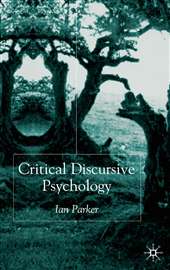| I Autori | Testi | Teorie | Costrutti Teorici | Articoli | Servizi | Associazione | Lavoro | Arte | Cerca nel sito | Iniziative | Collegamenti | Mappa |
|
||||||||||||||||||
Critical Discursive Psychology
Ian Parker

pagine 288
58,00 £
2002
Palgrave, London
'Critical Discursive Psychology collects more than a decade's intellectual work into a single volume...readers now have easy-access to some of the most pertinent, theoretically inspring, and discursively engaged of Parker's contributions.' - Catriona Macleod and Lindy wilbraham, Psychology in Society
Why is theory important to the practice of critical research? Why are debates over the role of discourse in psychology crucial to the way we interpret texts? This book explores crucial questions to do with discourse, subjectivity, postmodernism, psychoanalysis and Marxist theory in psychology. Key critical theoretical resources are described and assessed and a series of polemics is staged, bringing together writers who have helped shape critical work in psychology. The book also introduces key issues in critical discursive research in psychology, and outlines the historical context in the discipline for the emergence of qualitative debates. It also sets out methodological steps for critical readings of texts. The book makes available a set of debates at the intersection of theoretical intervention and political critique, and it maps the shape of critical discursive research for the twenty-first century.
Indice
Acknowledgements
Notes on Contributors
1 Theoretical Discourse, Subjectivity and Critical Psychology
Situated knowledge
Theoretical critical distance
Complex subjectivity
Conclusions and openingsPART I
Enlightenment, Realism and Power (and their Reverse)2 Against Postmodernism: Psychology in Cultural Context
Postmodern against the modern
A detour: postmodern narrative and Enlightenment
practice
Four Enlightenment reversals
Conclusion2a Against Against-ism: Comment on Parker
Fred Newman and Lois Holzman2b Critical Distance: Reply to Newman and Holzman
Knowing something
Knowing nothing3 Against Relativism in Psychology, On Balance
Introduction
For relativism, and against
For critical realism, and against
The separation and reconnection of moral–political critique3a Regulating Criticism: Some Comments on an Argumentative Complex
Jonathan Potter, Derek Edwards and Malcolm Ashmore
Introduction
Rhetorical troubles
Recruiting the tortured, oppressed and murdered
Critical realist psychology and critical realism in and against psychology
Trouble in the Parker-complex3b The Quintessentially Academic Position
4 Against Wittgenstein: Materialist Reflections on Language
in Psychology
Wittgenstein and psychology
Words, the world and power Psychology, again
Contexts
Connections and conclusions4a The Practical Turn in Psychology: Marx and Wittgenstein as Social Materialists
John. T. Jost and Curtis D. Hardin
The practical turn
Wittgenstein was not a relativist
(The later) Wittgenstein was not an essentialist
The politics of Wittgenstein
Synthesizing Marx and Wittgenstein4b Reference Points for Critical Theoretical Work in Psychology
Wittgenstein and Marx
Contradictions
SynthesisPART II
The Turn to Discourse as a Critical Theoretical Resource5 Discursive Psychology Uncut
Defining ‘discourse’
Historical resources: two traditions
Discourse analysis in psychology
Axes of difference in discursive research
Remaining questions6 Discourse: Definitions and Contradictions
Introduction
The turn to language
Criteria
Auxiliary criteria
Reflections and conclusions6a Discourse: Noun, Verb or Social Practice? Jonathan Potter, Margaret Wetherell, Ros Gill and Derek Edwards
Introduction
Discourse analysis: descriptive and constructive
Reification and intuitionInterpretative repertoires
6b The Context of Discourse: Let’s Not Throw the Baby Out With the Bathwater Dominic Abrams and Michael A. Hogg6c Real Things: Discourse, Context and Practice
Object status
Context
PracticePART III
Critical Discursive Research, Subjectivity and Practice7 Reflexive Research and Grounding of Analysis: Psychology and the Psy-Complex
Objectivity
Subjectivity
Discursive complexes
The psy-complex
Discussion
Concluding comments8 Tracing Therapeutic Discourse in Material Culture
The material
Analytic steps
Therapeutic discourse, subject positions and power
Concluding comments9 Constructing and Deconstructing Psychotherapeutic Discourse
Psychotherapeutic regimes of knowledge
Deconstructing psychotherapeutic knowledge10 Critical Reflections
Discipline
Culture
History
Institutions
ReflectionsReferences
Index